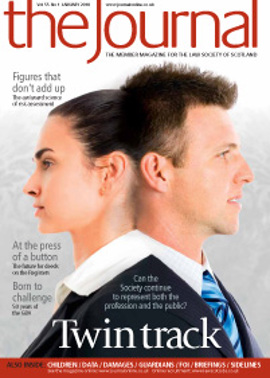Send in the SaaS

Three years ago Cameron Macaulay was probably no different to hundreds of other traditional high street law firms. The 10-year-old practice operated from two offices, providing a wide range of non-specialist services. Profit margins were too low, overheads too high and the danger of taking on too much to sustain the business model all too real.
Today the firm is reborn. Quality and client service are restored as the cornerstones. The constant rush and heavy workload have been replaced with the luxury of time to be more reflective and selective about cases. The work-life balance is restored, and the new civil court practice, relaunched in June 2009, is now inherently profitable.
The transformation has been brought about by the realisation that outsourcing just about everything to do with the running of the firm, from secretaries, to reception, to serviced offices and above all IT, is the modern way to run a practice.
On a cloud
Software as a Service (SaaS) means that small and medium sized practices now have as much computing power as the corporate legal firms. Any apartheid between rich and poor, or the large/small firm divide, has been removed. SaaS, or cloud computing, has allowed even the sole practitioner to benefit from remote servers of equal power to the monsters in the big firms, without the handicap of maintaining them.
In terms of systems, the playing field has been levelled. IT capital expenditure is zero and the quality and features of the software now available are far in excess of what would have been affordable by the previous high street setup, especially for case management. The cost of doing business has reduced by around 80%, but the quality of service is much improved.
Today the practice is run from plush serviced offices in the centre of Glasgow, which is convenient to clients, and from home. Client and case files are accessible online from either location and indeed from anywhere at any time. Business continuity, disaster recovery, backups and storage are now subject to service level agreements and guarantees which are the responsibility of a third party. SaaS is not the future: it is here now and it works.
Choosing a partner
Along the journey there have been some important lessons learned about choosing a SaaS supplier and letting go of the old mindset. Here are some tips.
Outsourcing is the goal, but it is vital to look for quality and value in the marketplace, whether that be the serviced office in a central location to replace high street premises, or the technology to support the business. In my experience it is important to carry out one’s own research into providers of legal software delivered as a service, rather than rely on others to do it for you. Search engines are an obvious route to discovery, especially as the suppliers will, by necessity, have a strong web presence.
Experience also taught me to look for independent commentary about the legal IT industry, as provided by services such as Legal Technology Insider. Supplier consolidation over the last few years has resulted in considerable product consolidation and fewer options. Take care to find out that the software you choose and train in, is destined for continuous development and support, and that you will not be forced to migrate to another product because support has been withdrawn once the dust has settled from the mergers and acquisitions.
Don’t be afraid to think big, as the cost-effectiveness of the SaaS model means that rich functionality is far more affordable than when running IT in-house. Full blown case management may have been out of reach before; now you can take advantage of all the bells and whistles. Features like time recording are essential, but look too for automated time recording of incoming and outgoing emails against the individual matter, which is an area often overlooked and time consuming to manage.
Perhaps one of the most difficult things to let go of, mentally speaking, is “server hugging”. There seems to be an emotional attachment and a false sense of security in having your own servers in-house. But think of the high cost of maintaining and upgrading those systems, managing new software releases and being responsible for backups. In-house servers can be less secure than backing up online. And you can get rid of the clutter. A means to connect to the internet to access applications and data is all that I need, whether at my city or home office.
Once you have drawn up a shortlist of possible suppliers, it also makes sense to investigate their financial viability as well as determining that the software available as a service meets your requirements. Do you like the people you will be dealing with? Those that have a true passion for the business, a long-term understanding of the requirements of law firms or a direct stake in the business themselves, may well go the extra mile in customer satisfaction.
New-look business
Look for added value services too. In Scotland, the smaller start-up faces the onerous and expensive task of complying with daily cash management regulatory reporting, which usually requires the skills of a legal cashier and places an instant overhead on the business. However, in my search for SaaS, I found and chose Virtual Practices, which provides SOS Connect, a modern and fully integrated case and practice management system on a monthly subscription basis. In addition their legal finance team provide an outsourced legal cashiering service, which they were quickly able to adapt to our rules in Scotland. This service effectively removes the administrative burden of compliance, reducing it to the simple entering of credit and debit vouchers. The service provides peace of mind that all records are accurately maintained and that reports are provided on time.
SaaS, or cloud computing, is no longer theoretical. The technology has reached a point where it is truly transformational in providing the smaller firm with a more profitable business model. In the past the treadmill of a heavy caseload and constant quest for new business to cover high overheads left little time for improving client service. Since moving to SaaS and outsourcing legal cashiering, I have saved around 25 hours a month in administrative time which is now available for remunerative work. In the reborn Cameron Macaulay, for the first time I can truly say that the business is organised around client service and delivering quality.
Malcolm Cameron is founding partner of Cameron Macaulay, solicitors, Glasgow
In this issue
- Forward thinking
- Renewal of transitional guardianships
- End the navel-gazing
- Who speaks for lawyers?
- Reasons to be hopeful
- The full picture
- Hearing and speaking
- Law of unintended consequences
- More prejudicial than probative?
- One giant leap
- If the cap fits
- Half a century of strife
- From the Brussels office
- Law reform update
- Send in the SaaS
- Ask Ash
- Words and sentences
- Two in one
- Enough to turn you to drink
- Uncertain security
- Protections with legs
- Working for the estate
- Home defences
- Splitting from the taxman
- Scottish Solicitors' Discipline Tribunal
- Website review
- Book reviews
- Route to freedom
- Steady as she goes is market forecast






